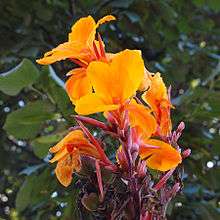canna
See also: Canna
English
Pronunciation
- (UK) IPA(key): /ˈkænə/
- Rhymes: -ænə
Etymology 1

From Latin canna (“reed”), from Ancient Greek κάννα (kánna, “reed”), from Akkadian 𒄀 (qanû, “reed”), from Sumerian 𒄀𒈾 (gi.na).
Noun
canna (plural cannas)
- Any member of the genus Canna of tropical plants with large leaves and often showy flowers.
- 2000, JG Ballard, Super-Cannes, Fourth Estate 2011, p. 7:
- A palisade of Canary palms formed an honour guard along the verges, while beds of golden cannas flamed from the central reservation.
- 2000, JG Ballard, Super-Cannes, Fourth Estate 2011, p. 7:
Verb
canna
- (Scotland, Jamaica) Contraction of can not; cannot.
- 1966 -- Star Trek: The Naked Time (wikiquote)
- Scotty: I canna' change the laws of physics.
- 1966 -- Star Trek: The Naked Time (wikiquote)
Translations
cannot — see cannot
French
Irish
Etymology
From Middle Irish cann, canna (“can, vessel”), borrowed from Old English canne.
Declension
Declension of canna
Fourth declension
|
Bare forms
|
Forms with the definite article
|
Derived terms
- (bheith, dul) ar na cannaí (“(to be, to get) ‘canned’, drunk”)
- canna bainne (“can of milk; milk-can”)
- canna bealaithe (“oiler”)
- canna breosla (“jerrycan”)
- canna cláir, canna adhmaid (“wooden pail”)
- canna ola (“oil can”)
- canna spraeála (“spray can”)
- canna spréite (“watering can”)
- canna stáin (“tin can”)
- canna tae (“can of tea; billy-can”)
- canna uisce (“water-can”)
- rud a cur i gcanna, i gcannaí (“to can something”)
Mutation
| Irish mutation | ||
|---|---|---|
| Radical | Lenition | Eclipsis |
| canna | channa | gcanna |
| Note: Some of these forms may be hypothetical. Not every possible mutated form of every word actually occurs. | ||
References
- "canna" in Foclóir Gaeilge-Béarla, An Gúm, 1977, by Niall Ó Dónaill.
- “cann” in Dictionary of the Irish Language, Royal Irish Academy, 1913–76.
- Entries containing “canna” in English-Irish Dictionary, An Gúm, 1959, by Tomás de Bhaldraithe.
- Entries containing “canna” in New English-Irish Dictionary by Foras na Gaeilge.
Italian
Etymology
From Latin canna, from Ancient Greek κάννα (kánna, “reed”), from Akkadian 𒄀 (qanû, “reed”), from Sumerian 𒄀𒈾 (gi.na).
Pronunciation
- IPA(key): /ˈkan.na/, [ˈkän̺n̺ä]
- Rhymes: -anna
- Stress: cànna
- Hyphenation: can‧na
Noun
canna f (plural canne)
- cane
- barrel (of a gun)
- canna cilidrica ― (please add an English translation of this usage example)
- (fishing) rod
- canna da pesca ― (please add an English translation of this usage example)
- tube, pipe (on a pump organ or a trachea)
- canne dell'organo ― (please add an English translation of this usage example)
- chute
- (slang) joint
- Synonym: spinello
- (historical) traditional unit of measure
Derived terms
- canna da pesca (“fishing rod”)
- canna fumaria (“flue, chimney”)
- canna metrica (“measuring rod”)
- cannone
Descendants
- → English: canna
Related terms
Latin
Etymology
Borrowed from Ancient Greek κάννα (kánna, “reed”), from Akkadian 𒄀 (qanû, “reed”), from Sumerian 𒄀𒈾 (gi.na).
Pronunciation
- (Classical) IPA(key): /ˈkan.na/
Noun
canna f (genitive cannae); first declension
Inflection
First declension.
| Case | Singular | Plural |
|---|---|---|
| Nominative | canna | cannae |
| Genitive | cannae | cannārum |
| Dative | cannae | cannīs |
| Accusative | cannam | cannās |
| Ablative | cannā | cannīs |
| Vocative | canna | cannae |
Related terms
Descendants
References
- canna in Charlton T. Lewis and Charles Short (1879) A Latin Dictionary, Oxford: Clarendon Press
This article is issued from
Wiktionary.
The text is licensed under Creative
Commons - Attribution - Sharealike.
Additional terms may apply for the media files.